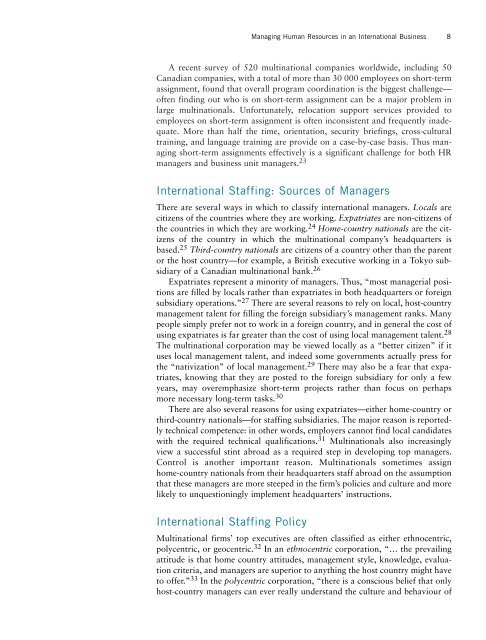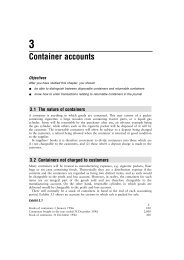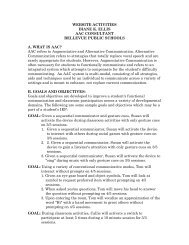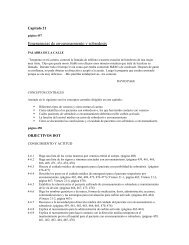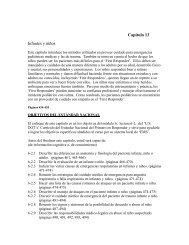Managing Human Resources in an International Business
Managing Human Resources in an International Business
Managing Human Resources in an International Business
You also want an ePaper? Increase the reach of your titles
YUMPU automatically turns print PDFs into web optimized ePapers that Google loves.
A recent survey of 520 mult<strong>in</strong>ational comp<strong>an</strong>ies worldwide, <strong>in</strong>clud<strong>in</strong>g 50<br />
C<strong>an</strong>adi<strong>an</strong> comp<strong>an</strong>ies, with a total of more th<strong>an</strong> 30 000 employees on short-term<br />
assignment, found that overall program coord<strong>in</strong>ation is the biggest challenge—<br />
often f<strong>in</strong>d<strong>in</strong>g out who is on short-term assignment c<strong>an</strong> be a major problem <strong>in</strong><br />
large mult<strong>in</strong>ationals. Unfortunately, relocation support services provided to<br />
employees on short-term assignment is often <strong>in</strong>consistent <strong>an</strong>d frequently <strong>in</strong>adequate.<br />
More th<strong>an</strong> half the time, orientation, security brief<strong>in</strong>gs, cross-cultural<br />
tra<strong>in</strong><strong>in</strong>g, <strong>an</strong>d l<strong>an</strong>guage tra<strong>in</strong><strong>in</strong>g are provide on a case-by-case basis. Thus m<strong>an</strong>ag<strong>in</strong>g<br />
short-term assignments effectively is a signific<strong>an</strong>t challenge for both HR<br />
m<strong>an</strong>agers <strong>an</strong>d bus<strong>in</strong>ess unit m<strong>an</strong>agers. 23<br />
<strong>International</strong> Staff<strong>in</strong>g: Sources of M<strong>an</strong>agers<br />
There are several ways <strong>in</strong> which to classify <strong>in</strong>ternational m<strong>an</strong>agers. Locals are<br />
citizens of the countries where they are work<strong>in</strong>g. Expatriates are non-citizens of<br />
the countries <strong>in</strong> which they are work<strong>in</strong>g. 24 Home-country nationals are the citizens<br />
of the country <strong>in</strong> which the mult<strong>in</strong>ational comp<strong>an</strong>y’s headquarters is<br />
based. 25 Third-country nationals are citizens of a country other th<strong>an</strong> the parent<br />
or the host country—for example, a British executive work<strong>in</strong>g <strong>in</strong> a Tokyo subsidiary<br />
of a C<strong>an</strong>adi<strong>an</strong> mult<strong>in</strong>ational b<strong>an</strong>k. 26<br />
Expatriates represent a m<strong>in</strong>ority of m<strong>an</strong>agers. Thus, “most m<strong>an</strong>agerial positions<br />
are filled by locals rather th<strong>an</strong> expatriates <strong>in</strong> both headquarters or foreign<br />
subsidiary operations.” 27 There are several reasons to rely on local, host-country<br />
m<strong>an</strong>agement talent for fill<strong>in</strong>g the foreign subsidiary’s m<strong>an</strong>agement r<strong>an</strong>ks. M<strong>an</strong>y<br />
people simply prefer not to work <strong>in</strong> a foreign country, <strong>an</strong>d <strong>in</strong> general the cost of<br />
us<strong>in</strong>g expatriates is far greater th<strong>an</strong> the cost of us<strong>in</strong>g local m<strong>an</strong>agement talent. 28<br />
The mult<strong>in</strong>ational corporation may be viewed locally as a “better citizen” if it<br />
uses local m<strong>an</strong>agement talent, <strong>an</strong>d <strong>in</strong>deed some governments actually press for<br />
the “nativization” of local m<strong>an</strong>agement. 29 There may also be a fear that expatriates,<br />
know<strong>in</strong>g that they are posted to the foreign subsidiary for only a few<br />
years, may overemphasize short-term projects rather th<strong>an</strong> focus on perhaps<br />
more necessary long-term tasks. 30<br />
There are also several reasons for us<strong>in</strong>g expatriates—either home-country or<br />
third-country nationals—for staff<strong>in</strong>g subsidiaries. The major reason is reportedly<br />
technical competence: <strong>in</strong> other words, employers c<strong>an</strong>not f<strong>in</strong>d local c<strong>an</strong>didates<br />
with the required technical qualifications. 31 Mult<strong>in</strong>ationals also <strong>in</strong>creas<strong>in</strong>gly<br />
view a successful st<strong>in</strong>t abroad as a required step <strong>in</strong> develop<strong>in</strong>g top m<strong>an</strong>agers.<br />
Control is <strong>an</strong>other import<strong>an</strong>t reason. Mult<strong>in</strong>ationals sometimes assign<br />
home-country nationals from their headquarters staff abroad on the assumption<br />
that these m<strong>an</strong>agers are more steeped <strong>in</strong> the firm’s policies <strong>an</strong>d culture <strong>an</strong>d more<br />
likely to unquestion<strong>in</strong>gly implement headquarters’ <strong>in</strong>structions.<br />
<strong>International</strong> Staff<strong>in</strong>g Policy<br />
<strong>M<strong>an</strong>ag<strong>in</strong>g</strong> <strong>Hum<strong>an</strong></strong> <strong>Resources</strong> <strong>in</strong> <strong>an</strong> <strong>International</strong> Bus<strong>in</strong>ess 8<br />
Mult<strong>in</strong>ational firms’ top executives are often classified as either ethnocentric,<br />
polycentric, or geocentric. 32 In <strong>an</strong> ethnocentric corporation, “… the prevail<strong>in</strong>g<br />
attitude is that home country attitudes, m<strong>an</strong>agement style, knowledge, evaluation<br />
criteria, <strong>an</strong>d m<strong>an</strong>agers are superior to <strong>an</strong>yth<strong>in</strong>g the host country might have<br />
to offer.” 33 In the polycentric corporation, “there is a conscious belief that only<br />
host-country m<strong>an</strong>agers c<strong>an</strong> ever really underst<strong>an</strong>d the culture <strong>an</strong>d behaviour of


